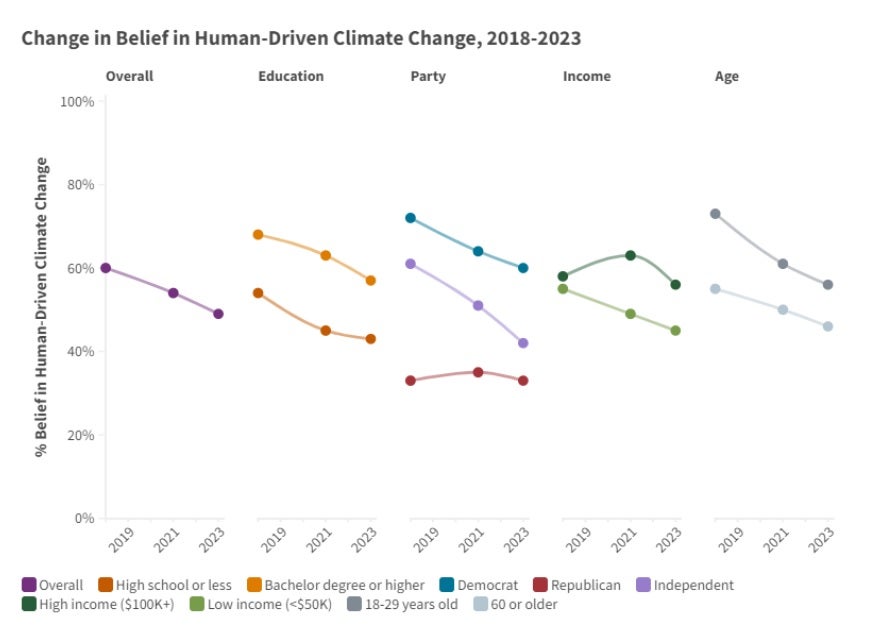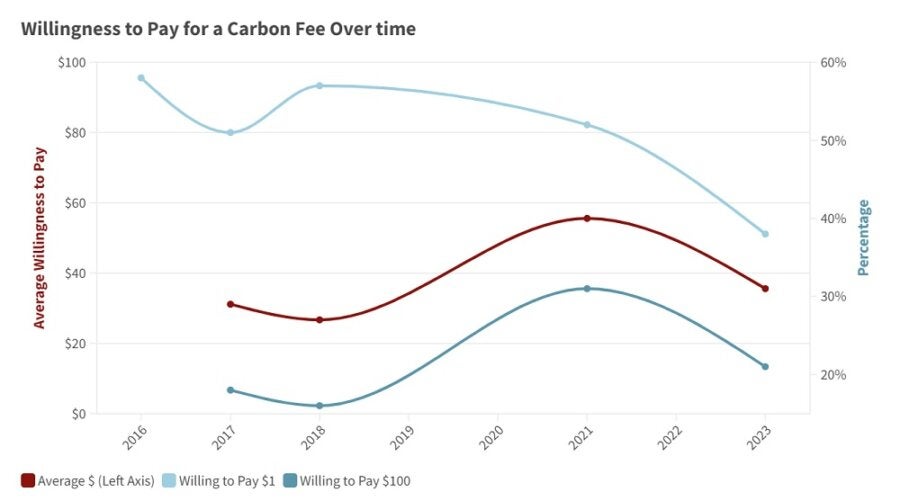Headlines about climate change have filled newsfeeds over the last few years, ranging from catastrophic (natural disasters, endangered species, dire predictions for the future) to a bit more optimistic (electrification, the transition to renewable energy, climate tech advances). The content we see and read plays a key role in shaping our opinions about climate change, but it remains a contentious topic. Is it real? Are humans causing it? How bad is it really? And what’s likely to happen in the future?
A survey carried out by the Energy Policy Institute at the University of Chicago (EPIC) and The Associated Press–NORC Center for Public Affairs Research aimed to find out how Americans really feel about climate change. The results were released over the last couple weeks in anticipation of Earth Day on April 22. In addition to general questions about climate change, the survey asked people about their views on energy policy and electric vehicles.
5,408 adults completed the survey between January 31 to February 15 of this year. There were respondents from all 50 US states, and they varied in age, race, gender, and education level.
In a nutshell, here’s what the survey found: Americans believe climate change is happening, but they’re not terribly worried about it, and are mostly not willing to spend money or go out of their way to help fix it.
Believers, Sort Of
74 percent of the survey respondents said they believe climate change is real. However, less than half—49 percent—believe it’s being caused by human activities (as opposed to natural changes in the environment). That 49 percent is down from 60 percent the last time this survey was carried out, in 2018. The change in viewpoint was uniform across education levels, from college graduates to those who stopped studying after high school. However, more people in the 18 to 29 age group changed their view than did those aged 60 or older.

In terms of actually taking action, more than half of respondents said they’re already trying to reduce their energy consumption (though this is likely as much of an effort to keep energy bills down as it is to help the environment). Some ways people are doing so is by using energy-efficient appliances (68 percent), turning off unnecessary lights (89 percent), using less paper and plastic (58 percent), eating less meat (37 percent), and using less heat and air conditioning (60 percent). These are relatively easy, low-cost actions that most anyone can take.
Fewer people are opting in to pricier climate-friendly actions, like putting solar panels on their home (11 percent), buying an electric or hybrid vehicle (12 percent), or getting electricity through a supplier that uses renewable sources (25 percent).
Hard to Cough Up the Cash
It seems that much of Americans’ willingness to help combat climate change comes down to economics. Almost two-thirds of those surveyed said they weren’t willing to pay any amount of money to combat climate change—not even $1 a month. 38 percent would pay $1 a month, and 21 percent would pay $100 a month.

How much people are willing to pay is likely more a function of their disposable income than of their concern over the environment. However, peoples’ willingness to shell out any amount of money, whether $1 or $100, decreased about 10 percent between 2021 and the present. This is likely because of the financial squeeze put on so many people by the pandemic and rising inflation; when you’re worried about making rent or buying groceries, helping the planet isn’t going to be high on your list.
“It’s striking that Americans’ willingness to pay even a $1 monthly fee to combat climate change fell to below half of respondents—the lowest level since we began tracking this data,” said Michael Greenstone, director of EPIC and an economics professor at the University of Chicago. “Americans’ willingness to pay for climate policy is far below what research projects climate change will cost society per ton of CO2 emissions.”
Similarly, 41 percent of people said they would buy an electric vehicle—if the long-term savings on gas and maintenance added up to more than the higher up-front cost of the car (cost was the biggest barrier to buying an EV). Those most likely to buy one are under 45 years old, live on the west coast in urban areas, and have high incomes. Unsurprisingly, people don’t want to be pushed into buying electric cars; just 35 percent support stricter fuel efficiency standards to encourage EV sales, and 27 percent are in favor of requiring new car sales to be electric or hybrid by 2035.
Help From Uncle Sam
Based on these responses, it seems we’re likely to find ourselves in a bit of a pickle in coming years. Despite believing in climate change, most Americans aren’t up for throwing much money at it. This must be partly due to the tough economic times we’re in; inflation and interest rates have soared, and whispers of an impending recession have been circulating for months.
But it’s also a sign that even once the economy improves and people feel more secure in their finances, real progress likely won’t be made without significant government intervention—that is, subsidies, regulation, and incentives. These need to be carefully balanced with practical concerns and realism, which can be a tall order.
Image Credit: Wikimedia Commons
* This article was originally published at Singularity Hub

0 Comments